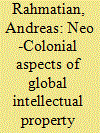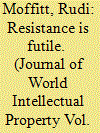| Srl | Item |
| 1 |
ID:
086725


|
|
|
|
|
| Publication |
2009.
|
| Summary/Abstract |
In this article, an attempt is made to capture experiences embodied through bilateral copyright relationships between Latin America and Spain (1884-1904). Special attention is devoted to issues bracketed off in traditional historical narratives, such as the always-decisive intervention of a suitable time to act and the techniques by which political relations outside the Berne Convention for the Protection of Literary and Artistic Property 1886 were established. In doing so, attempts are made to describe the practices in carrying out negotiations and to follow the simultaneous emergence of problems interwoven in those political practices. The main aim is to try to appreciate abilities to establish contacts and to frame different themes, prioritizing and singularizing issues, furnishing trust and helping to construct horizons in bilateral copyright relations.
|
|
|
|
|
|
|
|
|
|
|
|
|
|
|
|
| 2 |
ID:
086727


|
|
|
|
|
| Publication |
2009.
|
| Summary/Abstract |
An essential instrument in the process of neo-colonialism by economic means is the establishment of a legal framework of international trade that confers legally enforceable rights that support and safeguard economic penetration and control. This includes, in a similar way as in colonial times, the guarantee of protection of foreign property rights in dependent regions. Today, intellectual property rights fulfil this colonizing role to a large extent. It will be shown that the implementation of the Agreement on Trade-Related Aspects of Intellectual Property Rights is one major device that drives such an economic neo-colonialism forward. This is reflected in the history of the making of this treaty, as well as in the methods of enforcement of intellectual property rights, which will be demonstrated in the example of China. Besides this international expansion of Western-style intellectual property rights, there is another, seemingly contrasting and alternative non-proprietarian, legislative project, which nevertheless has neo-colonial effects: the protection of traditional cultural expressions in the context of "traditional" arts. The article discusses that, despite presumably good intentions, this measure reflects colonial features, such as the concept of indirect rule, and invites segregationist legislation.
|
|
|
|
|
|
|
|
|
|
|
|
|
|
|
|
| 3 |
ID:
086728


|
|
|
|
|
| Publication |
2009.
|
| Summary/Abstract |
The idea of resistance generally has normative associations, particularly in the current intellectual property (IP) environment. Justifications for actions are framed as supporting an aggrieved party in an unequal struggle against a clearly superior opposition. The adoption of the mantle of resistance is not limited to one side. Just as organizations such as Electronic Freedom Foundation claim they are part of the resistance to global corporate domination of culture, musicians, music owners and their associations portray themselves as mounting a resistance against a veritable tsunami of technology-driven piracy that threatens to destroy the production of culture and the livelihood of artists. This article starts from this point in order to question the assumptions we have about resistance. Using a paradigmatic framework, it will recast resistance as points in a historic process that are normatively neutral yet ontologically and practically potent. Application of this framework to the history of Anglo-American copyright reveals two types of resistance that bracket a major shift in the conceptualization and practice of the paradigm. In the end, this perspective demythologizes resistance. Resistance, in this perspective, is not emancipatory or heroic; it is another tool that can be useful in particular moments in the complex struggles over the defining of our social existence.
|
|
|
|
|
|
|
|
|
|
|
|
|
|
|
|